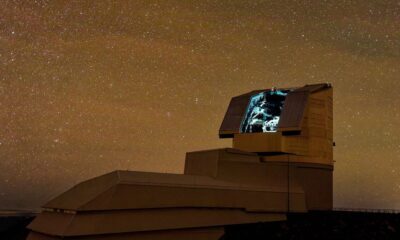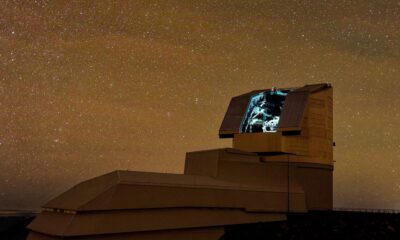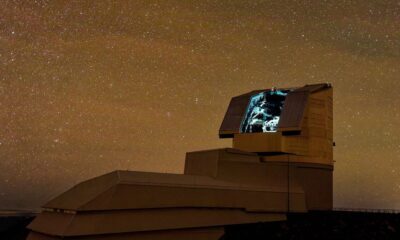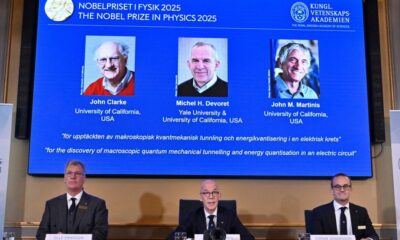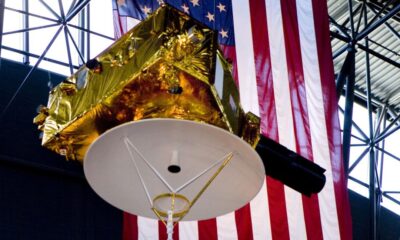Science
Astronomers Question Dark Energy’s Role in Universe’s Expansion

A recent study suggests that the expansion of the universe may be slowing down rather than accelerating, challenging long-held astronomical beliefs. This finding, if validated, could significantly alter our understanding of dark energy, a force that opposes gravity and has been critical in explaining the universe’s expansion since its discovery.
In 1998, two independent teams of astronomers observed Type 1a supernovas and concluded that dark energy was causing the universe to expand at an accelerating rate. Their observations indicated that distant supernovas were dimmer than expected, leading to the conclusion that they were moving away from Earth faster than previously thought. This groundbreaking discovery earned them the Nobel Prize in Physics in 2011.
New evidence, however, raises questions about these established notions. A study published on November 6, 2023, in the Monthly Notices of the Royal Astronomical Society suggests that dark energy may be weakening over time. Young-Wook Lee, a professor of astrophysics at Yonsei University in South Korea and the lead researcher of the study, states, “The present universe has already entered a decelerating phase.” He emphasizes that this finding could impact the ultimate fate of the universe.
The researchers examined a sample of 300 galaxies with Type 1a supernovas, proposing that the dimming of these stars resulted not solely from their distance from Earth but also from the age of their progenitor stars. Junhyuk Son, a doctoral candidate at Yonsei University and coauthor of the study, explained, “Before our work, Type Ia supernovae were thought to explode with nearly identical intrinsic brightness. However, we found that their luminosity depends on the age of the stars that produce them.”
The team asserts a high level of statistical confidence—99.99 percent—in the age-brightness correlation, which allows for more accurate assessments of the universe’s expansion. Son added, “If confirmed, this would represent the most significant shift in cosmology since the discovery of dark energy in 1998.”
As the research suggests a potential slowing of the universe’s expansion, astronomers speculate on the implications. A continued slowdown could lead to a contraction of the universe, potentially culminating in a scenario referred to as the “big crunch.” Lee remarked, “Even two years ago, the big crunch was out of the question. But we need more work to see whether it could actually happen.”
The study’s bold claims are met with skepticism from some experts in the field. Adam Riess, a professor of physics and astronomy at Johns Hopkins University, highlighted a perceived flaw in the research, stating, “It suggests supernovae have aged with the Universe, yet observations show the opposite.” He contends that the current understanding of supernovae remains intact.
Lee counters this skepticism by asserting that Type Ia supernovae are found in both old, quiescent galaxies and young, star-forming ones, which he believes undermines Riess’s argument. He also noted that the age-brightness correlation has been confirmed by independent teams in the United States and China.
Others, including Dan Scolnic from Duke University, also voiced concerns regarding the study’s conclusions. Scolnic pointed out that the research makes an unsubstantiated leap from the age of host galaxies to the age of supernovae. “The universe is still accelerating just fine,” he stated.
Despite the controversies, Lee acknowledges that the field may be on the brink of new discoveries. The recently launched Vera C. Rubin Observatory is set to begin its Legacy Survey of Space and Time in early 2026. This ambitious project aims to create an extensive time-lapse record of the universe over ten years, capturing data on supernovae and other cosmic phenomena.
Lee expressed optimism about the future of this research, stating, “Vera Rubin will discover more than 20,000 new supernova host galaxies with very high-precision age measurement.” This data could provide crucial insights into the age-bias effect and lead to a more accurate understanding of dark energy.
As the debate continues, Lee concluded, “Dark energy is getting weirder and weirder. There is no good theory that can explain this very weird behavior. So I think we are missing something.” The ongoing research into dark energy’s role in the universe promises to deepen our understanding of the cosmos and may yield surprising results in the years to come.
-

 Politics3 weeks ago
Politics3 weeks agoSecwepemc First Nation Seeks Aboriginal Title Over Kamloops Area
-

 World4 months ago
World4 months agoScientists Unearth Ancient Antarctic Ice to Unlock Climate Secrets
-

 Entertainment5 months ago
Entertainment5 months agoTrump and McCormick to Announce $70 Billion Energy Investments
-

 Lifestyle4 months ago
Lifestyle4 months agoTransLink Launches Food Truck Program to Boost Revenue in Vancouver
-

 Science5 months ago
Science5 months agoFour Astronauts Return to Earth After International Space Station Mission
-

 Technology3 months ago
Technology3 months agoApple Notes Enhances Functionality with Markdown Support in macOS 26
-

 Top Stories2 months ago
Top Stories2 months agoUrgent Update: Fatal Crash on Highway 99 Claims Life of Pitt Meadows Man
-

 Lifestyle3 months ago
Lifestyle3 months agoManitoba’s Burger Champion Shines Again Amid Dining Innovations
-

 Sports5 months ago
Sports5 months agoSearch Underway for Missing Hunter Amid Hokkaido Bear Emergency
-

 Politics4 months ago
Politics4 months agoUkrainian Tennis Star Elina Svitolina Faces Death Threats Online
-

 Politics4 months ago
Politics4 months agoCarney Engages First Nations Leaders at Development Law Summit
-

 Technology5 months ago
Technology5 months agoFrosthaven Launches Early Access on July 31, 2025

